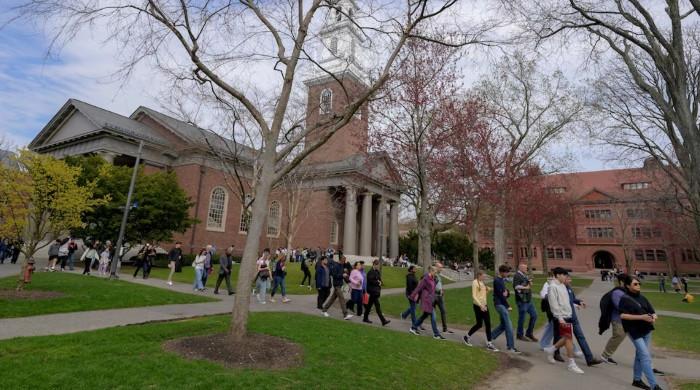Harvard Faces Potential Loss of Foreign Student Enrollment Amidst US Government Scrutiny
- Freedom of expression concerns are voiced by human rights advocates.
- This week, Harvard rebuffs demands from the Trump administration.
- The US government has blocked over $2 billion in Harvard’s funding.
The United States Department of Homeland Security has declared that Harvard University risks losing its authorization to enroll students from other countries if it fails to comply with demands from the Trump administration. These demands include sharing specific data related to visa holders, marking the latest intensification of the government’s stance against the academic institution.
Homeland Security Secretary Kristi Noem announced on Wednesday that two DHS grants to Harvard, amounting to more than $2.7 million, would be terminated.
Noem stated that she had sent a letter to Harvard, insisting on records pertaining to what she described as “illegal and violent activities” involving the university’s foreign student visa holders, with a deadline of April 30.
“If Harvard cannot demonstrate full compliance with its reporting obligations, it will forfeit the privilege of admitting students from abroad,” Noem conveyed in her public statement.
A Harvard representative acknowledged awareness of Secretary Noem’s communication concerning the grant cancellations and the examination of foreign student visas.
The representative affirmed the university’s continued support for its earlier declaration to “not concede its autonomy or give up its constitutional protections,” while also promising adherence to legal requirements.
The Trump administration has been issuing warnings to universities about potential reductions in federal funding due to campus demonstrations perceived as pro-Palestinian.
In addition, the authorities are making attempts to deport certain foreign demonstrators and have already cancelled hundreds of visas across the nation.
Secretary Noem asserted, “With a $53.2 billion endowment, Harvard has the means to finance its own disarray—the DHS will not,” while also claiming the presence of an “anti-American, pro-Hamas ideology” within Harvard.
Harvard has previously stated its commitment to combating antisemitism and other forms of prejudice on its campus, alongside safeguarding academic freedom and the right to protest.
Trump’s Measures
Late last month, the Trump administration announced a review of $9 billion in federal contracts and grants awarded to Harvard. Subsequently, they advocated for the implementation of restrictions—including a prohibition on masks and the removal of diversity, equity, and inclusion initiatives—as prerequisites for Harvard to continue receiving federal funds.
On Monday, Harvard declined several demands that it argued would mean ceding control to the government. Following this, the Trump administration announced the freezing of $2.3 billion in funding.
Moreover, on Tuesday, President Trump raised the possibility of revoking Harvard’s tax-exempt status. One media outlet reported on Wednesday that the US Internal Revenue Service is formulating plans to withdraw Harvard’s tax-exempt status, with a final decision anticipated in the near future.
Harvard maintains that there is no legal justification for revoking its tax-exempt status, describing such an action as unprecedented, potentially detrimental to its financial aid programs for students, and possibly leading to the suspension of vital medical research programs.
Human rights advocates have voiced concerns regarding free speech and academic freedoms in light of the government’s actions.
The Trump administration has also taken steps to freeze or cancel funding for other universities, including Columbia, Princeton, Brown, Cornell, and Northwestern.
Additionally, it has issued warnings about withholding funding due to disagreements over cultural issues, such as diversity, equity, and inclusion (DEI) programs, as well as transgender policies.



Comments (0)
No comments yet. Be the first to comment!
Leave a Comment